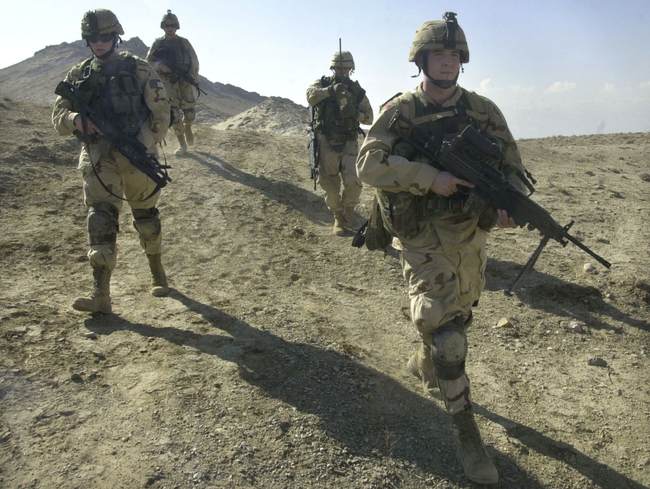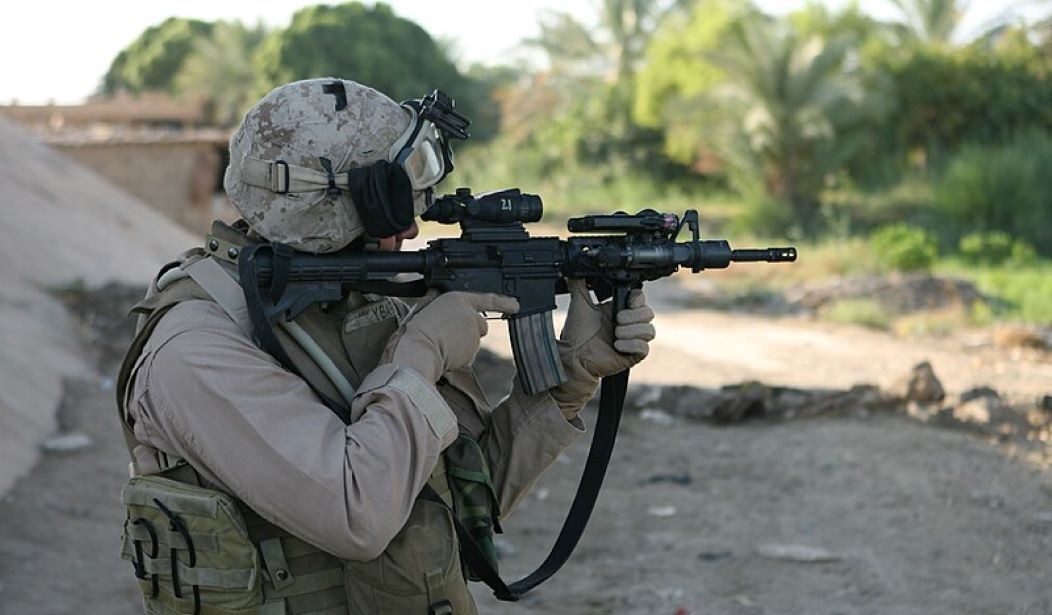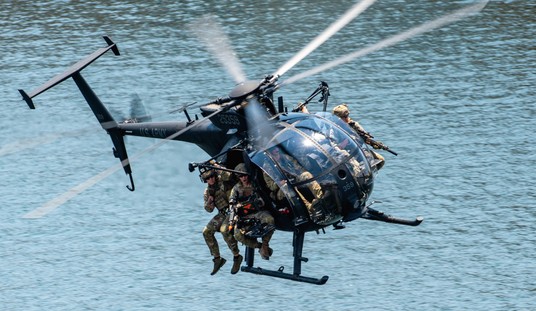The White House today has signaled to House Republicans that Biden intends to veto their military spending bill, which includes a roughly 30 percent pay raise for all junior enlisted member ranks from E-1 through E-6, citing opposition to language in the bill regarding social justice issues like abortion and transgender issues.
President Biden wants to veto a historic 30% pay raise for our junior enlisted troops.
— Rep. Mike Garcia (@RepMikeGarcia) September 20, 2023
My military pay raise gets our servicemembers off food stamps and above the poverty line. Biden’s rationale for this veto threat is unfounded, short-sighted, and dangerous. @WhiteHouse @SecDef… pic.twitter.com/u00VyVk0wS
Under the spending bill advanced by the House Appropriations Committee earlier this year and scheduled to be voted on by the full House later this week, no service member would make less than the equivalent of $15 per hour for a 40-hour workweek.
America's warfighters are the ones who are tasked with taking on the burden that the overwhelming majority of Americans do not want to do or are unable to do. They are the ones that carry the weight, walk and fight with it, and so much more. People, like myself, who served or are serving in combat arms military occupational specialties like infantry, artillery, tanks, and more, are America's warfighters. We are the ones that are "sent unto the breach," and we are the ones that spill the blood, including our own. We are the ones who carry the burden of combat with us for our entire lives. We are the ones who have to see and experience the hell that is war. And when we are not in or at war, we are training for the next one, and as I stated earlier, that is incredibly dangerous in and of itself.
Historically, the United States has never paid its service members a considerably high wage, especially its junior enlisted members. For reference, an E-1 in 1947 made just $70 a month, with the main caveat being costs were nowhere near what they are today. Today, an E-1 with over four months of service makes $1,917.60 per month, and an E-6 with three years of service makes $3,424.80 per month. These are all pay scales and rates without being taxed. There are several different types of additional allowances for certain statuses, like being married with dependents, uniform allowances, and others, but the pay is not drastically changed.
While serving in the Marine Corps, I was promoted to Corporal (E-4) in my 3rd year, about halfway through my first deployment to Iraq in 2003 and that made my pay go up to $1,726.80 a month from $1,528.80. The big differences in pay for me, came when I deployed to Iraq. There, I received combat pay, along with having no federal or state taxes withheld from my pay, because a combat zone or hostile duty zone was considered a tax-free assignment. Which made my pay, roughly double what it was in the States. I came back from my first tour in Iraq after 10 months in October of 2003, and I had almost $16,000 in my account and I thought I was richer than Bill Gates.
While serving in the military, even at the lowest rank, one doesn't have to pay for housing, food, health, or dental insurance. It is all deducted from our pay before we even see it, in fact, it isn't even listed on our LES, or Leave and Earning Statement (military equivalent for a pay stub). The only things listed on our LESs were our take-home pay and all the taxes that were deducted. The one thing that we as service members are required to pay for is our uniforms. But you have a uniform allowance for that so you don't really pay right? Wrong. Our uniform allowance was only $1,213.35 annually. The Marine Corps required several uniforms to be maintained in our wall lockers (our clothes cabinet). I could explain in great detail what our uniform requirements are, but I will save you the misery. I will just say that our uniform allowance is paid monthly and is never enough to cover what we need. Boots alone were bought frequently due to needing different boots for different things and they cost well over $100 per pair. To "help us maintain our uniform requirements" our commanders advised us all to get STAR Cards, which basically is a military credit card. So we all got one and it had a $1,000 credit limit which we quickly ran all the way up and had to start paying that every month.
The life of a junior enlisted, especially those from E-1 through E-4, is financially burdensome. We didn't make enough money to really do much outside of the base, so most of us ran up more credit card debt, and some of us went straight to the payday advance place and borrowed even more money. For those poor souls who wanted to buy a car and didn't know what to deal with, they got bent over backward by the dealerships. Guys were coming back with brand-new cars and trucks with 25 to 30 percent loans, they didn't know any better. Most, and I mean the overwhelming majority of junior enlisted has at one point lived paycheck to paycheck at best; I did for some time too. Then when it came time to do taxes, we didn't know, and or couldn't afford a private company to do our taxes, which really could have helped us out. Our only option was to go to the base IPAC (base admin offices and services) office and wait in line for another Marine to do our taxes for us. There were no write-offs, no deductions, nothing like that; it was hand over our W2 and get back a refund form that says we'll be getting back a refund of $300.
That is the financial life of a junior enlisted service member. We really do not make much of anything, our raises are predominantly all COLA-related, nothing more. When politicians typically brag about that three or even 8 percent raise for the troops, it is almost always just a COLA/inflation pay adjustment to keep up with the rise in both. But that only happens every four or six years at best. We knew what we were worth, and for the most part, we didn't care. It really hurts to say it, but we really did think, and I guarantee that most (junior enlisted) still do, that America really didn't give a damn about us. But that didn't stop us from wanting to do our jobs. We signed up for this, we knew what we were walking into (mostly) and we carried on with a smile.
But we knew then and they know now, that if you're a boot (new guy) Private or PFC, you are worth and make less than somebody that works in fast food. And if states like California get their way, fast food workers at major chains can get paid far more than them. In states like California, if the bill passes and is signed by Newsom, their pay will be $22 an hour, which makes an average monthly salary with a 40-hour work week, approximately $3,800. Someone like myself, serving in the Infantry military occupational field, as an E-1 Private makes half that. One flips burgers, and the other at a minimum is trained in rifle marksmanship, land navigation with a compass and a map, radio and hand signal communications, and able to carry a full combat load in excess of 65 pounds minimum at distances of up to and including 20 plus miles in any terrain and weather, is trained in hand to hand combat, can be able to call in medivac or artillery or mortar fire mission via radio, using proper procedure; I could go on and on. Yet that E-1 Private makes half of what that burger flipper makes, and the worst part is they know it. Yet for some insane reason, we love it. I loved it.

The best way to support our troops financially, which wouldn't cost a penny to the taxpayer (which includes the military) is to make all military service a tax-free system. With roughly 2.1 million servicemembers, including reserve and guard personnel, at their current salaries, does not make a significant contributor to the tax revenue scheme currently in use in America. Add that to the fact that a large percentage of these men and women are in jobs that are incredibly dangerous in peacetime, let alone active combat. By eliminating the tax burden on American military service members on Active Duty, you can enrich their lives without adding a penny to military spending. It is literally the most cost-effective way to put more money in their pockets. And tax revenue reduction impact on the states where service members are stationed would be minimal, as would the Federal impact. It is a burden that should be taken on as a thank you to service members, who absolutely deserve it
Allowing all service members to take home their entire pay rate without any reduction due to taxes or other withholdings would be a game changer for everyone, but specifically, it would be a huge difference to the E-1 Private, Airman, Seaman, and more. Those servicemembers would be taking home all $1,917.60 every month. It may not seem like a lot to the majority of this country, but I can tell you from a personal standpoint, that anything and everything helps. Getting our pay to be tax-free, however, is a huge bump. A question I would ask any politician, especially President Biden "Aren't we worth it?" Time for the politicians of both parties to open their eyes and think big picture, in addition to thinking about other ways they can help put more money in the service member's wallet and bank account. And eliminating the tax burden from them is a huge step in the right direction.














